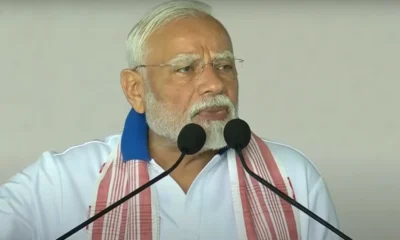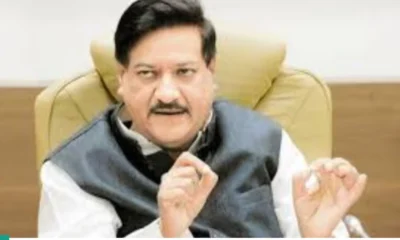A uniform civil code (UCC) is neither necessary nor desirable at this stage, said the Law Commission in a report that destroys the decades-old poll plank of BJP and its mascot, the present prime minister Narendra Modi.
The report of the Law Commission headed by Justice (Retd) BS Chauhan, coming on a day when its term drew to a close on Friday, August 31, however, suggested a slew of reforms in existing personal and marriage laws in its consultative paper on ‘Reform of Family Law’.
“A united ‘nation’ need not necessarily have ‘uniformity’, it is making diversity reconcile with certain universal and indisputable arguments on human rights,” the Law Commission noted in its report.
The Law Commission was entrusted with the task of addressing the issues concerning a uniform civil code in June 2016 through a reference by the Government of India.
In its report, the law panel said UCC is neither necessary nor desirable at this stage. Holding that current personal laws need reforms, it said there is need to maintain harmony between religious customs and fundamental rights.
In the absence of any consensus on a UCC the Commission felt that the best way forward may be to preserve the diversity of personal laws but at the same time ensure that personal laws do not contradict fundamental rights guaranteed under the Constitution of India.
For this, it said it is desirable that all personal laws relating to matters of family must first be codified to the greatest extent possible, and the inequalities that have crept into codified law, these should be remedied by amendment.
Further, the Law Commission said, the very act of codifying separate ‘personal laws could itself be challenged as exercise against Article 14 of the Constitution. It urged that the legislature should, therefore, first consider guaranteeing equality within communities ‘between men and women, rather than equality between ‘communities’.
This way some of the differences within personal laws which are meaningful can be preserved and inequality can be weeded out to the greatest extent possible without absolute uniformity.
While diversity of Indian culture can and should be celebrated, specific groups, or weaker sections of the society must not be disprivileged in the process, the report said.
Resolution of this conflict does not mean abolition of difference.
“This Commission has therefore dealt with laws that are discriminatory rather than providing a uniform civil code which is neither necessary nor desirable at this stage,” the Law Commission said.
“Most countries are now moving towards recognition of difference, and the mere existence of difference does not imply discrimination, but is indicative of a robust democracy,” said the Commission.
It pointed out that the Schedule VI of the Constitution of India provides certain protections to a number of states. “While some tribal laws in fact protect matriarchal systems of family organisations some of these also preserve provisions which are not in the interest of women… While framing a law it has to be borne in mind… cultural diversity cannot be compromised to the extent that our urge for uniformity itself becomes a reason for threat to the territorial integrity of the nation,” it said.
“While there is certainly a desire for change, there is also equally a need to acknowledge the hindrances to any endeavours to institute a uniform civil code. The first foreseeable problem with feasibility is with respect to the sixth schedule of the Constitution. Articles 371 (A) to (I) and the sixth schedule of the constitution of India provides certain protections or rather exceptions to the states of Assam, Nagaland, Mizoram, Andhra Pradesh and Goa with respect to family law,” the report added.
“Many also argue that a uniform code may advance the cause of national integration, however, this may not necessarily be the case when cultural difference inform people‘s identity and its preservation guarantees the territorial integrity of the nation. Further, the law has to be within the framework of the Constitution,” the Law Commission significantly noted.
“A united ‘nation’ need not necessarily have ‘uniformity’, it is making diversity reconcile with certain universal and indisputable arguments on human rights,” it added.
It said that through codification of different personal laws, one can arrive at certain universal principles that prioritise equity rather than imposition of a uniform code in procedure which can also discourage many from using the law altogether given that matters of marriage and divorce can also be settled extra judicially.
Thus, there are certain universal principles with regard to adultery, age of consent, grounds for divorce et al that can be integrated into all existing statutory provision on marriage and divorce under personal and civil laws, while the procedure for divorce, and grounds for divorce may vary between communities
On Adultery, the Commission has noted:
“While all family laws include adultery as a ground for divorce it is important to ensure that the provision is accessible to both spouses.”
“By presuming, that only women can be victims, the law takes a patronising attitude towards women. The prosecution under section 497 entirely contingent on the husband’s word to the extent that a woman can practically enter into an adulterous relationship upon her husband‘s consent, thereby reducing her to a commodity of a man.”
“The Commission was assigned the task of undertaking a study on the provision of adultery within its report. As the judgment of the Constitution Bench in Joseph Shine v. Union of India is awaited, (hearing stood concluded) it is not appropriate for the Commission to make any suggestion in this regard at this stage but it urges a consideration about the utility or the lack there of, of a provision such as 497 IPC.”
On Age of Consent for Marriage, the report says:
“A uniform age of consent between all citizens of marriage warrants a separate conversation from a discussion about prevention of child marriages for the simple reason that maintaining the difference of 18 years for girls and 21 years for boys simply contributes to the stereotype that wives must be younger than their husbands.”
“If a universal age for majority is recognised, and that grants all citizens the right to choose their governments, surely, they must then be also considered capable of choosing their spouses. For equality in the true sense, the insistence on recognising different ages of marriage between consenting adults must be abolished. The age of majority must be recognised uniformly as the legal age for marriage for men and women alike.”
On Grounds For Divorce, the report notes:
“Encouraging a simplified procedure for divorce is imperative for sustaining a healthy perception of marriage which is free of any discrimination or violence. Simplifying the procedure for couples where no reconciliation is possible would also be beneficial in curbing the false allegations against parties, which are often made in order to hasten the process of divorce. Lengthy procedures incentivise the use of severe grounds such as cruelty and adultery rather in order to secure a divorce which may have been prompted merely by inability of the partners to find mental, emotional or physical compatibility.”
On Muslim Personal Law, Triple Talaq, Polygamy and related issues, the Commission has said:
“The practice of triple talaq which finds no anchor in Islamic jurisprudence and is permitted only within a limited sect of Hanafi school of Sunni Muslims, is not a part of Sharia and therefore is arbitrary. The section 2 of the Muslim Personal Law (Shariat) Application Act, 1937 through which the power and procedure for dissolution of marriage by triple talaq is said to be derived, is declared void (only to the extent that procedure is arbitrary). Once this is struck down the arbitrariness of this procedure ceases to be a part of personal law and therefore does not qualify for protection under the fundamental rights guaranteed under Articles 25-28 of the Constitution.”
“The issue of family law reform does not need to be approached as a policy that is against the religious sensibilities of individuals but simply as one promoting harmony between religion and constitutionalism, in a way that no citizen is left disadvantaged on account of their religion and at the same time every citizen’s right to freedom of religion is equally protected.”
“Since triple talaq is already outlawed, pronouncing of triple talaq in one sitting has no effect on marriage.”
“Although polygamy is permitted within Islam, it is a rare practice among Indian Muslims, on the other hand it is frequently misused by persons of other religions who convert as Muslims solely for the purpose of solemnising another marriage rather than Muslim themselves.”
“The Nikahnama itself should make it clear that polygamy is a criminal offence… This is not recommended owing to merely a moral position on bigamy, or to glorify monogamy, but emanates from the fact that only a man is permitted multiple wives which is unfair. Since the matter is sub judice before the Supreme Court, the Commission reserves its recommendation.”
On Special Marriage Act, the report says:
“One of the major problems highlighted in the series of consultations held by the Commission was that the 30-day notice period after the registration of marriage under the Act is often misused. The 30-days period offers an opportunity to kin of the couple to discourage an inter-caste or an inter-religion marriage.”
“It is of paramount importance in the current scenario that couples opting into cross-community marriages are adequately protected.”
“The Commission urges a reduction of this (30-day) period to bring the procedure in line with all other personal laws, where registration of under Hindu Marriage Act,1955 can be attained in a day and signing of a Nikahnama also confers the status of husband and wife on the couple immediately.”
“Steps for the protection of the couples can be taken, if there is reasonable apprehension of threat to their life or liberty, and the couple request for the same. Thus, the requirement of a thirty days notice period from sections 5, 6, 7, and 16 needs to be either deleted or adequate protections for the couple need to be in place. All other general amendments such as introduction of irretrievable marriage as ground for divorce and community of property discussed earlier must also be incorporated in the SMA,1954.”


 Latest world news17 hours ago
Latest world news17 hours ago
 Latest world news18 hours ago
Latest world news18 hours ago
 Cricket news18 hours ago
Cricket news18 hours ago
 India News14 hours ago
India News14 hours ago
 India News9 hours ago
India News9 hours ago















